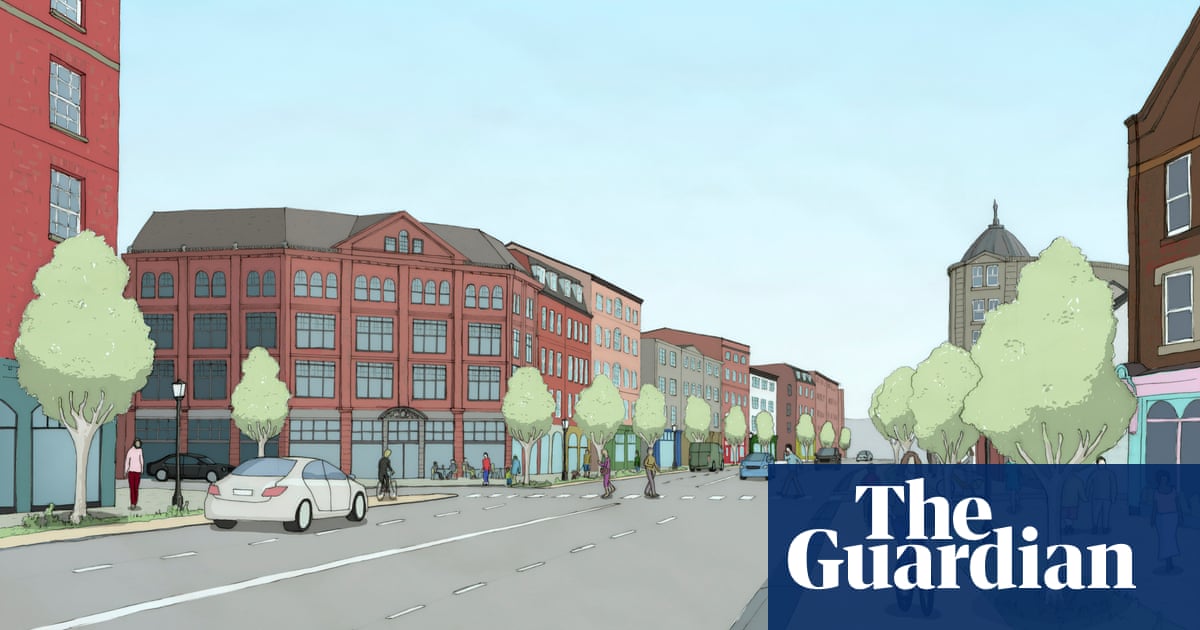
Needlessly wide roads should be torn up and replaced with boulevards of new housing, a thinktank led by the UK government’s most senior urbanism adviser has proposed, in a move likely to delight green belt campaigners but rile the motoring lobby.
Create Streets wants sweeping T-junctions tightened, vast roundabouts “tamed” and expressways narrowed according to a paper to be circulated to ministers and seen by the Guardian.
Amid a worsening housing crisis that is increasing pressure to erect homes in the countryside, it says: “Forget green belt. This is Britain’s road belt and it’s time to build on it.”
Early stage design projects to test the approach are under way in Rochdale, Bedford and Southend-on-Sea.
The idea comes as motoring and housing rise up the political agenda. Amid signs of a culture war, Rishi Sunak has told motorists he is “on their side” and launched a review of low-traffic neighbourhoods. He unsuccessfully tried to overrule Sadiq Khan’s extension of London’s £12.50 a day ultra low emissions zone. Both initiatives have become lightning rods for wider political debates about personal freedom, inequality and, in some cases, conspiracy theories about shadowy forces attempting to control the population.
Meanwhile, the government is 125,000 below its target to build 300,000 homes a year by the middle of this decade, based on official figures for England for the year to April, and its latest planning policy requires “suitable brownfield sites and underutilised land” to be used before the green belt.
Create Streets was founded by Nicholas Boys Smith, who leads the government’s new “building beautifully” agency, the Office for Place. It has influenced the Conservatives’ latest planning policies and counts one of King Charles’s leading urbanism advisers, Ben Bolgar, among its collaborators.
Its proposal states: “We could create proud boulevards lined with beautiful homes on space currently given over to needlessly, counterproductively wide roads.”
Boys Smith said: “It is no secret that the most productive and prosperous cities, including London … don’t exclusively rely on cars to get around,. It is time not to widen our road belt but to build upon it.”
Steve Gooding, the director of the pro-motoring thinktank the RAC Foundation, said narrowing roads would require planners to decide which traffic they no longer wanted.
“Grand visions need to be backed up by meticulous planning and adequate funding if they are to be turned into a livable reality where our shops are well-stocked, our kids can get to school, and our home deliveries arrive when we expect them,” he said.
He conceded that increasing the number of 20mph zones meant sweeping junctions and large roundabouts designed decades ago for higher speeds could be revisited, but “it remains to be seen whether linking that with housing development unlocks the scale of investment that’s currently beyond the reach of our cash-strapped local councils”.
David Milner, the deputy director of Create Streets, who wrote the policy paper, said: “Working together, there is no reason these redundant spaces can’t be turned into beautiful streets and beautiful homes.”
A scheme involving Rochdale council is exploring removing a turning lane from a four-lane urban highway at St Mary’s Gate in the north of the town, allowing designers to create a corner block, and adding 400 homes.
Milner said Birmingham was one place that had partly “broken its concrete collar”, where the fast inner ring road was removed in the late 1980s. In Bedford, a plan has been mooted for 105 homes by redesigning the wide Greyfriars roundabout.










